The NVIDIA GeForce GTX 780 Ti Review
by Ryan Smith on November 7, 2013 9:01 AM ESTOverclocking
Finally, let’s spend a bit of time looking at the overclocking prospects for the GTX 780 Ti. Although GTX 780 Ti is now the fastest GK110 part, based on what we've seen with GTX 780 and GTX Titan there should still be some headroom to play with. Meanwhile there will also be the matter of memory overclocking, as 7GHz GDDR5 on a 384-bit bus presents us with a new baseline that we haven't seen before.
| GeForce GTX 780 Ti Overclocking | ||||
| Stock | Overclocked | |||
| Core Clock | 876MHz | 1026MHz | ||
| Boost Clock | 928MHz | 1078MHz | ||
| Max Boost Clock | 1020MHz | 1169MHz | ||
| Memory Clock | 7GHz | 7.6GHz | ||
| Max Voltage | 1.187v | 1.187v | ||
Overall our overclock for the GTX 780 Ti is a bit on the low side compared to the other GTX 780 cards we’ve seen in the past, but not immensely so. With a GPU overclock of 150MHz, we’re able to push the base clock and maximum boost clocks ahead by 17% and 14% respectively, which should further extend NVIDIA’s performance lead by a similar amount.
Meanwhile the inability to unlock a higher boost bin through overvolting is somewhat disappointing, as this is the first time we’ve seen this happen. To be clear here GTX 780 Ti does support overvolting – our card offers up to another 75mV of voltage – however on closer examination our card doesn’t have a higher bin within reach; 75mV isn’t enough to reach the next validated bin. Apparently this is something that can happen with the way NVIDIA bins their chips and implements overvolting, though this the first time we’ve seen a card actually suffer from this. The end result is that it limits our ability to boost at the highest bins, as we’d normally have a bin or two unlocked to further increase the maximum boost clock.
As for memory overclocking, we were able to squeeze out a bit more out of our 7GHz GDDR5, pushing our memory clock 600MHz (9%) higher to 7.6GHz. Memory overclocking is always something of a roll of the dice, so it’s not clear here whether this is average or not for a GK110 setup with 7GHz GDDR5. Given the general drawbacks of a wider memory bus we wouldn’t be surprised if this was average, but at the same time in practice GK110 cards haven’t shown themselves to be as memory bandwidth limited as GK104 cards. So 9%, though a smaller gain than what we’ve seen on other cards, should still provide GTX 780 Ti with enough to keep the overclocked GPU well fed.
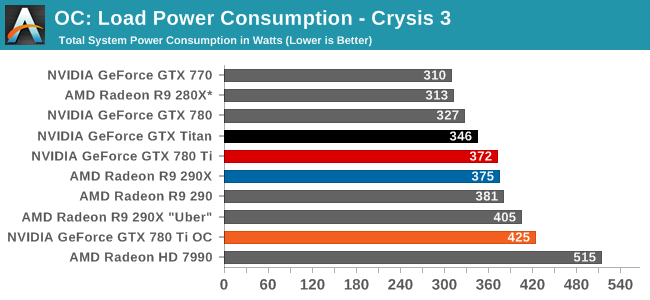
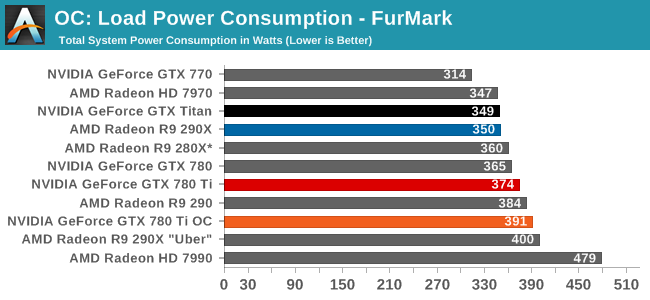
Starting as always with power, temperatures, and noise, we can see that overclocking GTX 780 Ti further increases its power consumption, and to roughly the same degree as what we’ve seen with GTX 780 and GTX Titan in the past. With a maximum TDP of just 106% (265W) the change isn’t so much that the card’s power limit has been significantly lifted – as indicated by FurMark – but rather raising the temperature limit virtually eliminates temperature throttling and as such allows the card to more frequently stay at its highest, most power hungry boost bins.
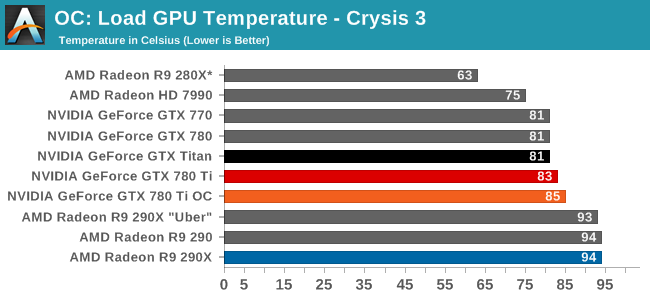
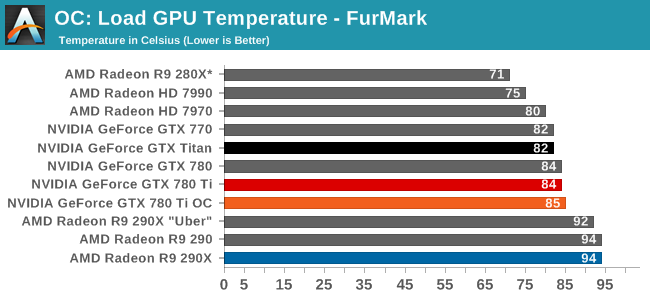
Despite the 95C temperature target we use for overclocking, the GTX 780 Ti finds its new equilibrium point at 85C. The fan will ramp up long before it allows us to get into the 90s.
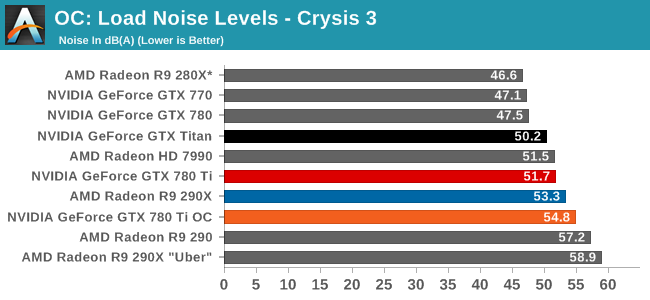
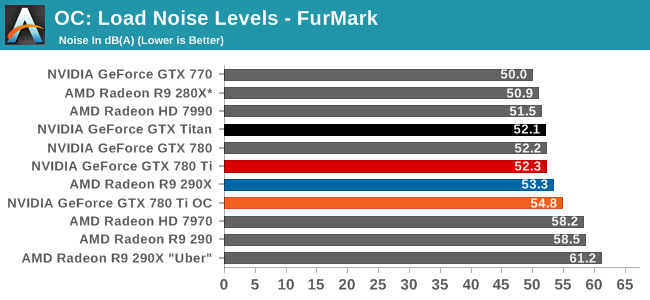
Given the power jump we saw with Crysis 3 the noise ramp up is surprisingly decent. A 3dB rise in noise is going to be noticeable, but even in these overclocked conditions it will avoid being an ear splitting change. To that end overclocking means we’re getting off of GK110’s standard noise efficiency curve just as it does for power, so the cost will almost always outpace the payoff on a relative basis.
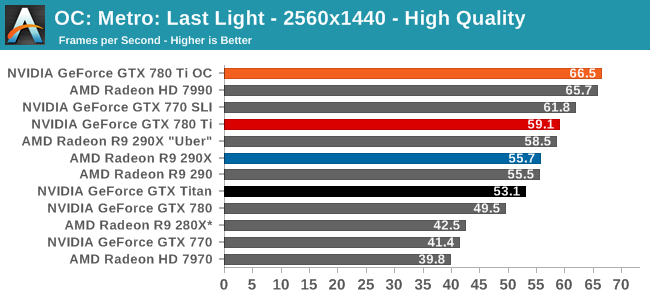
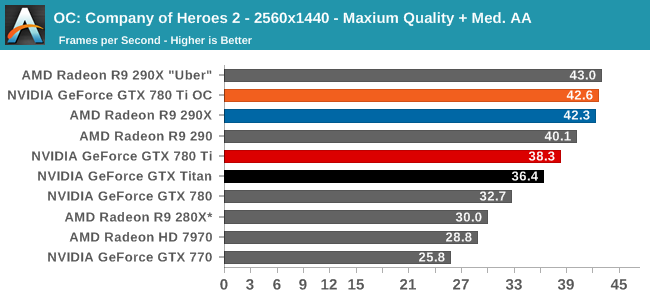
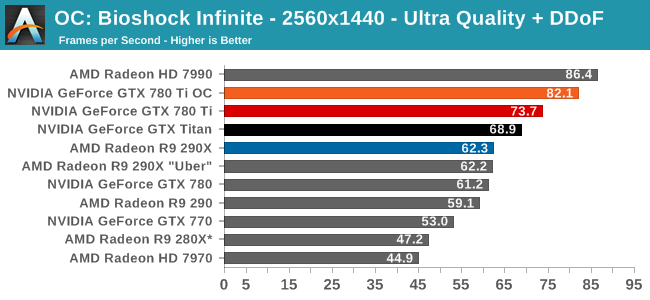
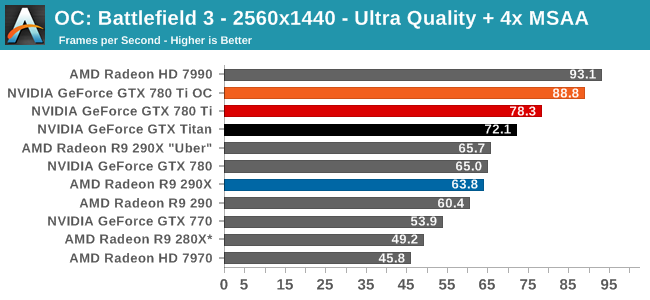
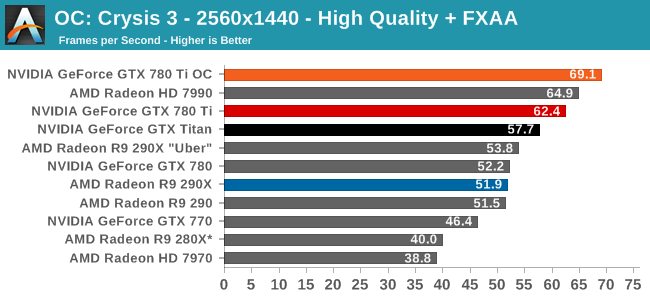
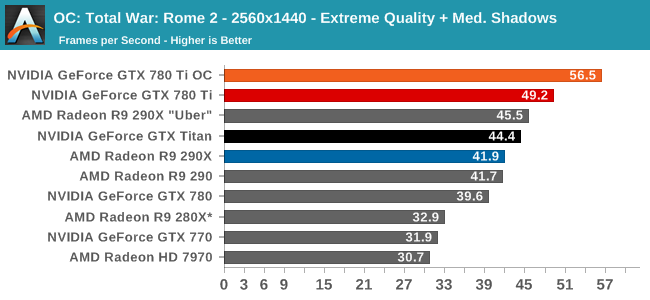
Finally, looking at gaming performance the the overall performance gains for overclocking are generally consistent. Between our 6 games we see a 10-14% performance increase, all in excess of the memory overclock and closely tracking the GPU overclock. GTX 780 Ti is already the fastest single-GPU card, so this only further improves its performance lead. But it does so while cutting into whatever is above it, be it the games where the stock 290X has a lead, or multi-GPU setups such as the 7990.










302 Comments
View All Comments
dwade123 - Friday, November 8, 2013 - link
Only morons will buy current gen cards on steroids.MLSCrow - Friday, November 8, 2013 - link
Never in all my life of being a supporter of Anandtech have I been so disgusted by the overly obvious bias toward NVidia. The GTX780Ti is a JOKE at $700.just4U - Friday, November 8, 2013 - link
As much as I hate to admit this.. I "DO" like to see AMD succeed.. that being said I don't favor them over NVidia.. and Anandtech's reviews are fair/balanced. I think all reviewers have a preference.. and sometimes that shows in their reviews.. but it's really hard to pinpoint what Ryan's are. The guy can't win with NVidia or AMD die-hard fans. He gets criticized for being a fanboy of both.Ranger101 - Friday, November 8, 2013 - link
I hear you, I have followed Anandtech for decades but this kind of rubbish is definitely making me think about looking at other tech sites for a balanced perspective...shame on you Anandtech.Ranger101 - Friday, November 8, 2013 - link
At 4K resolutions the R290X beats 780Ti every time. How is it possible to conclude that 780Ti is 11% faster than R290X when the former card is consistently beaten at 4K resolutions which is the ultimate test of a cards speed? How much is Nvidia paying you to write this junk?polaco - Friday, November 8, 2013 - link
Indeed that performance difference is very tricky. In most cases they are head to head. And for 150 bucks less it's a no brainer 290X is the winner. However 290 seems so sweet at that price that puts me into real doubt if 290X is worthy. Radeon 290 looks lovely.Yojimbo - Friday, November 8, 2013 - link
He explains his reasoning quite clearly, and I think the reasoning is sound. 4K resolution is still out of the reach of a single-GPU card, because in order to achieve it, one must either accept painfully low frame rates, or run on extremely low quality settings, no matter what single-GPU card is chosen. Neither of these options makes much sense, but if you wish to take advantage of them, the data is there and you are free to ignore his analysis and pursue your own; Buy a 290X and a 4K monitor. But in terms of "victory" for AMD, it seems to me that running 4K somewhat faster, but still not fast enough to be usable, is meaningless.Jaboobins - Friday, November 8, 2013 - link
The memory frequency for the GTX 770 is wrong. It needs to be 7Ghz not 6Ghz.But damn is that 780 GTX ti is fast!
wwwcd - Friday, November 8, 2013 - link
I got a rumour for r9 290x with 8GB 7+ GHz GDDR5 VRAM. WoW!, if that will be made real the card be have twice speed bandwidth than normal refferent r9 290x. GTX 780 will be downed to ground. Hardly ;)slickr - Friday, November 8, 2013 - link
At $700 its a bit too expensive, especially when you consider it averages only about 5% increase in performance over the Titan and about 9% increase in performance over the 780, which when translated to raw numbers, its only 3-4 frames.I mean whether a game runs at 50 or 54 frames is of no significance, especially if you have to pay $200 more for it.
I think the 780 Ti is good in its own right, but its just not good enough when compared to the competition and when you consider the price.
The 290x is $550 and in some cases is still faster than the 780 Ti, all this with a terribly designed cooler, which will be replaced by custom coolers by 3rd party in the next week or two.
So at this point we are looking at a $550 290x with a custom cooler that will be able to run even faster with a better cooler, which means beating the new 780 Ti in many benchmarks and drawing in others all at $150 less.
So yeah, Nvidia may have released a slightly faster card than the 780 and Titan, but considering the price and what the competition is offering, it isn't very appealing.
If it launched at $600 it may have been reasonable and you have a 10% slower 780 at $500 and in between the 290x at $550 and it could make sense to go for the 780Ti, but right now I don't really see the appeal.